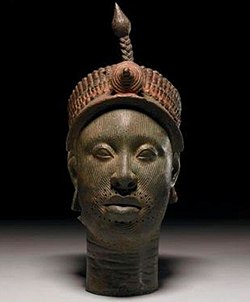Rulers
| Part of a series on |
| Yorùbá people |
|---|
 |
About 43 rulers had ruled with the title of Osemawe of Ondo Kingdom since the inception of the title. [8]
16th-century rulers
Princess Olu Pupupu ascended the throne as the first Osemawe of the Ekimogun people of Ondo Kingdom and reign from 1516 to 1530. [9] Before her death, she gave birth two sons, the eldest was named Airo Pupupu and the younger one was named Luju Pupupu. Airo Pupupu later ascended the throne after the demise of his mother in 1530. He reigned for 30 years, between 1530 and 1560. After the death of Airo Pupupu in 1560, Luju Pupupu the younger brother of Airo Pupupu ascended the throne in 1561 and reigned for 29 years, between 1561 and 1590. [10] After the demise of Luju Pupupu in 1590, prince Okuta Airo Pupupu the son of Airo Pupupu succeeded his uncle, Luju Pupupu in 1590 and reigned for 24 years, between 1590 and 1614.
17th-century rulers
After the demise of Okuta Airo Pupupu, his brother, Luyare ascended the throne and reigned for 16 years, 1614 to 1630. After the demise of Luyare in 1630, Foyi (Awuro), a brave warrior and a descendant of Luju Pupupu ascended the throne and reigned for 19 years, between 1630 and 1649. Thereafter, Leyo Luju Pupupu, the last child of Luju Pupupu ascended the throne after the death of Foyi (Awuro) and reigned for 19 years, between 1649 and 1688. [11] After the death of Leyo Luju Pupupu in 1668, prince Gbaji (Ogbode), the son of Okuta ascended the throne and reigned between 1668 and 1685. Thereafter, Liyen, the grandson of Luju Pupupu succeeded Gbaji (Ogbode) and reigned between 1685 and 1702.
18th-century ruler
After the demise of Liyen in 1702, Bajumu, a great warrior who was the son of Foyi ascended the throne. He engaged in a war with a neighboring town against the wish of the people and when he returned from the battle, he was rejected and was succeeded by Aperuwa (Olu-Okun), the son of Gbaji who reigned between 1711 and 1716. [12] After his demise in 1716, he was succeeded by Gbedegbede, a descendant of Leyo and only reigned for one year, between 1716 and 1717. Following the demise of Gbedegbede in 1717, Lamele succeeded him and reigned for 15 years before he died in 1731. In 1731, Iganmude who was a grandson of Okuta ascended the throne following the demise of Lamele. He created Sokoti and Losare quarters during his regime and later died in 1748. Olowolaiye, a grandson of Okuta became the ruler following the death of Aganmude. He reigned for 11 years, from 1748 to 1759. Following the death of Aganmude in 1759, another grandson of Okuta called Jogunde ascended the throne. He reigned for 18 years, from 1759 to 1777. Thereafter, Terere who was a grandson of Luju ascended the throne following the demise of Jogunde in 1777. He established the Eku festival in memory of Owu war before his death in 1786. He was succeeded by his first son called Ajisowo who reigned between 1786 and 1802.